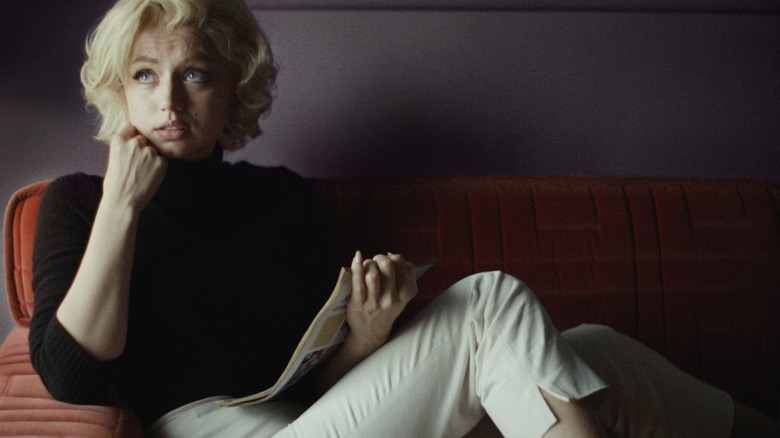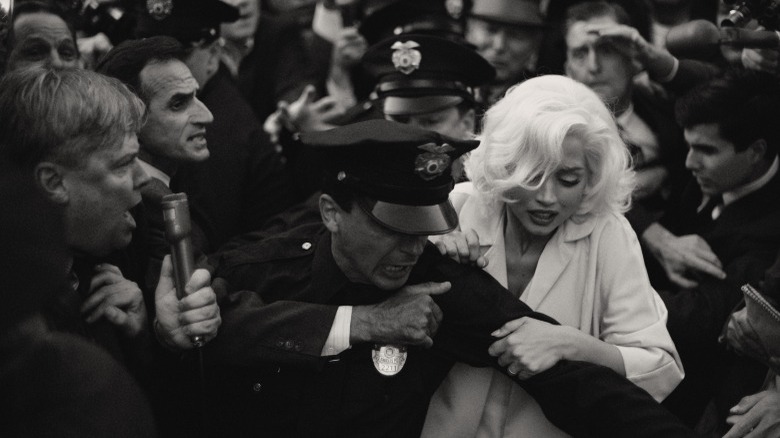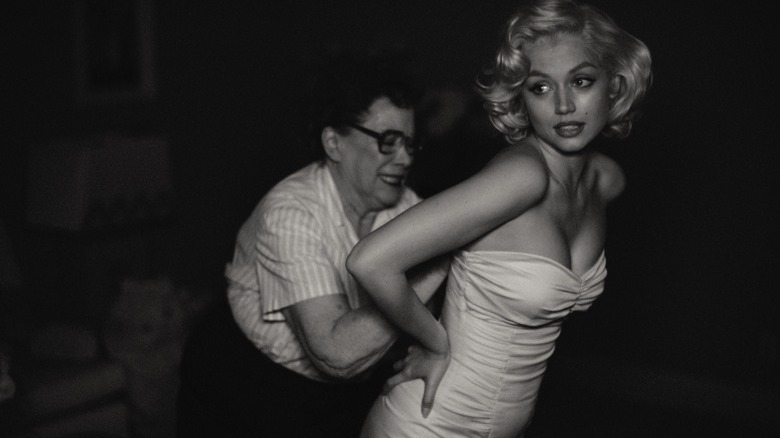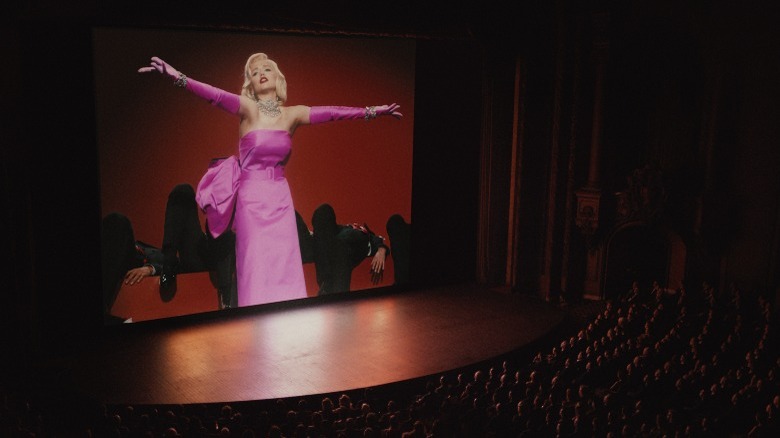Ana De Armas Thinks Audiences Struggle To Understand Blonde Isn't A Biopic
It's "Actors on Actors" season over at Variety, which means every day brings us a new interesting or unlikely sound bite from in-depth conversations between award-season contenders. Among this season's pairings is Eddie Redmayne, who appeared this year in "The Good Nurse," and Ana de Armas, whose performance as Marilyn Monroe in Andrew Dominik's "Blonde" has been mostly overshadowed by intense responses to the film's controversial elements. The pair sat down to speak about their work, and along the way, de Armas responded to some of the criticisms of the NC-17 Netflix film.
De Armas chalks a lot of the response to "Blonde" — which /Film's Chris Evangelista calls both "a lightning rod for controversy" and "a living monument to the star" — up to confusion over genre. The film, which features a version of Monroe whose life includes brutal abuse, sexual assault, an abortion, a miscarriage, and a string of otherwise devastating moments, is based not on reality but on Joyce Carol Oates' novel about the famed actress. "I think that's what has been tough for the audience to understand about the movie," de Armas says in the Variety interview. "The emotional truth is so powerful in the film that it's hard to separate that it's not a biopic."
"There is this photographic memory that we all have of Marilyn," de Armas tells Redmayne. "So we think we know what was happening at that time. The film is giving a different interpretation to those images, mixed with the story of the book." The actress explains that she's heard feedback about parts of Monroe's life the film may have missed, as well as responses indicating the story failed to show the actor's life outside of her depression. "I'm like, 'I know, but we're not telling that story,'" de Armas concludes.
Andrew Dominik has said the same thing (and a lot more, too)
To be fair to these critics, the press surrounding the film, including de Armas' own previous statements, doesn't make the fictionality of "Blonde" particularly clear. In fact, several times in the past, parties involved in the film have indicated that they think the story in some way digs into a core truth about Monroe. In an interview with Sight & Sound magazine, Dominik claimed that when making the film, he was "not interested in reality," but only in images of Monroe, adding that the film is "all fiction" because "nobody really knows what the f*** happened." Despite this assertion, he also shared a take on Monroe's real life that aligns perfectly with the film's polarizing philosophies, saying, "people want to say that she took control of her life. But she wanted to destroy her life."
Just last week, Dominik spoke about the film at the Red Sea International Film Festival, and according to Variety, he said that it's "kind of strange" that American audiences were upset to see a disempowered Monroe on screen, "because she's dead." He bluntly added, "What they really mean is that the film exploited their memory of her, their image of her, which is fair enough." He then once again asserted that the film is meant as fiction.
Exposing, honoring, or something else?
While Dominik has repeatedly explained that the film wasn't meant as a biopic (while sharing plenty of his own questionable conclusions about the real Monroe in the process), the author of the source material, Oates, also seemed to blur the lines between fact and fiction when she tweeted a response to criticisms that included the phrase, "some see the exposure of sexual mistreatment of Marilyn Monroe as 'exploitation.'" It's unclear what Oates believes the film is exposing here, since her own work is a novel, and a Monroe biographer told Entertainment Weekly that he spoke with over 700 people about the actress and didn't find any evidence she was raped as shown in the film.
De Armas herself has previously indicated that she felt the pressure of playing a real person, albeit with more reverence for Monroe. In a press conference about the film covered by Screen Daily in September, she said, "All of us feel so much respect and responsibility to do good and to honor her," adding that "everyone knew that we were in her service." She even went so far as to say she felt Monroe's presence during a shoot in her former home, saying, "She was approving of what we were doing." This is obviously a far cry from Dominik's "who the f*** knows" attitude toward the subject.
It makes sense that people are confused
All in all, the lines between the fact and fiction of Marilyn Monroe seem to be constantly muddled in public discussions of "Blonde," to the point that the question of whether or not the cast and crew have a responsibility to stay true to the real actor's legacy has overshadowed the film itself. While viewers I've spoken to with criticisms of the film are perfectly aware of its non-biographical status and are mostly bothered by Dominik's choice to co-opt pieces of Monroe's life regardless, there are also likely others who stumble across it on Netflix and take it as gospel — albeit of an aesthetically impressionistic variety.
It's easy to call something "not a biopic," but when it centers on a real woman whose life has long since been painfully misunderstood — and uses her real name, imagery from her life, and even her death site as a shooting location — there's bound to be some confusion over the filmmaker's intentions towards the subject.
You can watch de Armas' full conversation with Redmayne here. "Blonde" is now on Netflix.



